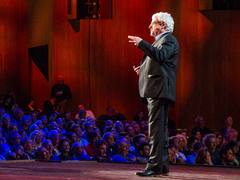“Science, we generally are told, is a very well-ordered mechanism for understanding the world, for gaining facts, for gaining data,” biologist Stuart Firestein says in today’s TED talk. “I’d like to tell you that’s not the case.”
 Stuart Firestein: The pursuit of ignorance
Instead, Firestein proposes that science is really about ignorance — about seeking answers rather than collecting them. He ‘fesses up: “I use this word ‘ignorance’ to be at least, in part, intentionally provocative, because ignorance has a lot of bad connotations and I clearly don’t mean any of those. I don’t mean stupidity, I don’t mean a callow indifference to fact or reason or data,” he explains. “I mean a kind of ignorance that’s less pejorative, a kind of ignorance that comes from a communal gap in our knowledge, something that’s just not there to be known or isn’t known well enough yet or we can’t make predictions from.”
Stuart Firestein: The pursuit of ignorance
Instead, Firestein proposes that science is really about ignorance — about seeking answers rather than collecting them. He ‘fesses up: “I use this word ‘ignorance’ to be at least, in part, intentionally provocative, because ignorance has a lot of bad connotations and I clearly don’t mean any of those. I don’t mean stupidity, I don’t mean a callow indifference to fact or reason or data,” he explains. “I mean a kind of ignorance that’s less pejorative, a kind of ignorance that comes from a communal gap in our knowledge, something that’s just not there to be known or isn’t known well enough yet or we can’t make predictions from.”
Firestein explains that ignorance, in fact, grows from knowledge — that is, the more we know, the more we realize there is yet to be discovered. The purpose of gaining knowledge is, in fact, “to make better ignorance: to come up with, if you will, higher quality ignorance,” he describes. “The purpose is to be able to ask lots of questions — to be able to frame thoughtful, interesting questions — because that’s where the work is.”
The Columbia University professor of biological sciences peppers his talk with beautiful quotations celebrating this very specific type of ignorance. Here, a few he highlighted, along with a few other favorites:
1. “Thoroughly conscious ignorance is the prelude to every real advance in science.” James Clerk Maxwell, a nineteenth-century physicist quoted by Firestein.
2. “Part of what we also have to train people to do is to learn to love the questions themselves. If all you want in life are answers, then science is not for you. We have things that always give you answers to things–like religion… In science, on the frontier, the answers haven’t come yet. That’s why we have people working on the frontier.” Neil deGrasse Tyson on Bullseye.
3. “The great obstacle to discovering the shape of the earth, the continents and the ocean was not ignorance but the illusion of knowledge.” Daniel J. Boorstin, The Discoverers.
4. “Science is always wrong. It never solves a problem without creating 10 more.” George Bernard Shaw, at a dinner celebrating Einstein (quoted by Firestein in his book, Ignorance: How it Drives Science).
5. “Every answer given on principle of experience begets a fresh question.” Immanuel Kant‘s Principle of Question Propagation (featured in Evolution of the Human Diet).
6. “I know nothing except the fact of my ignorance.” Socrates, quoted in Diogenes Laertius, Lives of the Philosphers (via the Yale Book of Quotations).
7. “Ignorance is the first requisite of the historian — ignorance, which simplifies and clarifies, which selects and omits, with a placid perfection unattainable by the highest art.” Lytton Strachey, biographer and critic, Eminent Victorians, 1918 (via the Yale Book of Quotations).
8. “In an honest search for knowledge, you quite often have to abide by ignorance for an indefinite period.” Erwin Schrodinger, quantum physicist (quoted in Gaither’s Dictionary of Scientific Quotations).
9. “There is a theory which states that if ever anyone discovered exactly what the Universe is for and why it is here, it will instantly disappear and be replaced by something even more bizarrely inexplicable. There is another theory which states that this has already happened.” Douglas Adams, The Hitchhiker’s Guide to the Galaxy “Fit the Seventh” radio program, 1978 (via the Yale Book of Quotations).
10. “Ignorance follows knowledge, not the other way around.” Stuart Firestein, Ignorance: How It Drives Science.

Comments (52)
Pingback: Memahami [Batasan] Ketidaktahuan – Reader's Notes
Pingback: A More Beautiful Question - Warren Berger - Read. Think. Act.
Pingback: Quora
Pingback: Science is really about ignorance | LiteracyNZ
Pingback: My City: Khurram Siddiqi on how not to get lost in Lahore, Pakistan | TokNok Multi Social Blogging Solutions
Pingback: TED News in Brief: Wired profiles Sugata Mitra, while Andrew Bird plays a concert for the National Parks | TokNok Multi Social Blogging Solutions
Pingback: The one rule in Jack Andraka’s basement laboratory—don’t burn the house down | TokNok Multi Social Blogging Solutions
Pingback: In praise of ignorance | Learning Sciences of Change
Pingback: MAGIC VIDEO HUB | If you liked Amy Webb, you’ll love…
Pingback: MAGIC VIDEO HUB | My City: Inaki Romero Larrea on building a better Madrid
Pingback: If you liked Amy Webb, you’ll love… | TokNok Multi Social Blogging Solutions